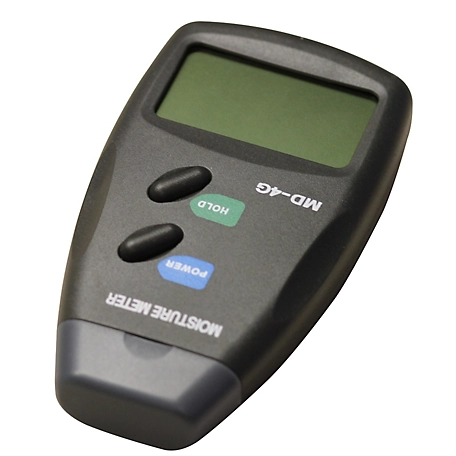Leading 10 Benefits of Using a Moisture Meter for Accurate Measurements in Your Home
The Ultimate Guide to Dampness Meters: A Comprehensive Introduction and Exactly How They Can Save You Cash
Dampness meters serve as essential devices in discovering and keeping track of moisture web content in materials, assisting in stopping costly damages and guaranteeing the quality of products. Understanding the nuances of various types of dampness meters, their applications, and the prospective cost-saving advantages they provide can be a game-changer for organizations and experts alike.
Kinds Of Dampness Meters
One usual kind is the pin-type dampness meter, which gauges the electric resistance in between 2 pins placed right into a material. Pinless moisture meters, on the other hand, use electromagnetic sensing unit plates to scan a larger area without triggering damages to the product's surface area.

Infrared wetness meters measure the thermal residential properties of a material to establish its dampness web content non-invasively, making them helpful for applications where pin or pinless meters might not be appropriate. Comprehending the different kinds of wetness meters available can aid industries pick the most suitable device for their specific wetness dimension needs.

Advantages of Using Dampness Meters
Wetness meters provide invaluable benefits in properly analyzing and monitoring moisture degrees in varied products and atmospheres. One of the key advantages of utilizing wetness meters is the avoidance of possible damages caused by excess moisture.
Moreover, making use of wetness meters can bring about raised power efficiency. By recognizing locations with high wetness levels, such as leakages or inadequate insulation, adjustments can be made to boost energy preservation and reduce utility costs. In agricultural settings, moisture meters play a critical function in enhancing plant returns by making it possible for farmers to check dirt moisture degrees and make informed watering decisions. On the whole, the advantages of using wetness meters span throughout various markets, providing cost-efficient options and promoting far better quality assurance techniques.
Exactly How to Pick the Right Moisture Meter
Picking the ideal moisture meter includes considering crucial variables such as material compatibility, dimension range, and calibration accuracy. When selecting a dampness meter, it's vital to ensure that the meter appropriates for the certain product you will certainly be testing. Different materials have varying electrical residential properties that can impact dampness analyses, so selecting a meter designed for your material is important for exact outcomes. In addition, take into consideration the measurement variety of the moisture meter. Guarantee that the meter can discover dampness degrees within the array required for your go to these guys applications. Calibration accuracy is another important variable to maintain in mind. Go with a moisture meter with trusted calibration to make certain precise and consistent readings. Some meters might call for routine calibration adjustments, so understanding the calibration process is crucial. By meticulously reviewing these elements, you can select a moisture meter that meets your demands and provides precise wetness measurements for your projects.
Correct Methods for Moisture Meter Use

Price Savings Through Moisture Meter Applications
Exactly how can the calculated application of dampness meters lead to substantial cost savings across different markets? In the agriculture market, moisture meters aid in establishing the optimum time for collecting crops, protecting against over-drying or excess dampness that can influence the last item's quality.
Similarly, in building and construction, dampness meters aid protect against pricey damages by spotting dampness levels in building products, such as wood or concrete, which can result in architectural problems otherwise attended to quickly. By recognizing problem locations early, contractors can take rehabilitative measures to stay clear of substantial repairs or substitutes, ultimately saving time and money.
In addition, in the food handling market, dampness meters are necessary for keeping track of item quality and making certain conformity with security guidelines. By properly gauging moisture material in food, manufacturers can avoid wasting, keep quality, and reduce waste, resulting in substantial cost savings. Overall, the calculated application of dampness meters is a valuable investment that can result Extra resources in considerable expense reductions and enhanced effectiveness across different sectors.
Verdict
Finally, moisture meters are valuable tools for finding and gauging moisture levels in different products. By using the ideal Recommended Site dampness meter and complying with appropriate strategies, customers can properly avoid expensive damages triggered by excess wetness. Purchasing a quality dampness meter can lead to significant cost financial savings over time by recognizing potential issues early on and enabling timely removal. Eventually, wetness meters are crucial tools for keeping the honesty and longevity of products and frameworks.
Moisture meters offer as crucial tools in detecting and keeping track of moisture content in products, aiding in protecting against expensive problems and guaranteeing the quality of items. Infrared dampness meters measure the thermal residential properties of a material to determine its dampness content non-invasively, making them helpful for applications where pin or pinless meters might not be appropriate.Dampness meters supply important benefits in precisely analyzing and checking dampness degrees in diverse products and environments. In farming settings, dampness meters play a critical role in optimizing crop yields by making it possible for farmers to monitor soil wetness degrees and make educated watering choices.In verdict, moisture meters are important tools for finding and gauging moisture levels in various materials.